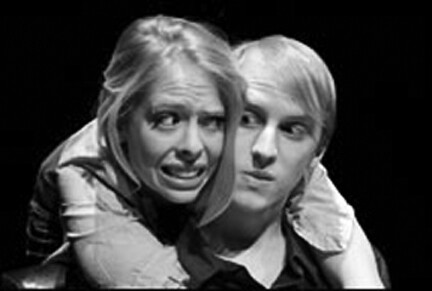
Courtesy Photo: Brad Greening and Rachel Boyce rehearse
Madeline Brinkley
The Paw Print
As the director Kaitlyn Perham professes, “Love comes in all forms”. Perham’s, “Will You Please Shut Up?” was significantly short of a Shakespearean Romance. The play started off with completely normal “Hellos!” from two tense individuals, already grinding the edges of annoying. Sylvia and Tom haven’t seen each other in years when they bump into each other on the NYC subway. They were the loves of each other’s lives, but something got in the way… They discuss, quite informally, their newly found occupations. Tom, interestingly enough, has found work as a drag queen and Sylvia, a sitcom writer. Her show, ‘We Used to Date’ is a play out of her and Tom’s relationship. Moving backwards in time, the play traces the origins of their toxic loathing to a once idyllic love.
The degradation of the relationship is beautifully portrayed but becomes increasingly more uncomfortable for the audience as you slip into the minds of the actor and see the idiosyncrasies that have annoyed you so much in them possibly exist in you. “Will You Please Shut Up?” ruthlessly pinpoint the absurdities, insecurities, and indulgences that riddle modern relationships. If anything, the play left me with a valuable reminder of why I’m not living with my boyfriend. But on a more serious note, the play is a self reflection for most couples on the dynamics they should look to overcome.
Abby Sandoval’s, “The Lottery” came just in time for the Halloween season. With scares and creepy vibes on the mind for Halloween festivities, the play fit right in. June 27 is looming around this small village. They all gather to have their names drawn from a hat, not excluding the children. The lottery in this town has a winner and a loser. Nancy Hutchinson and her brother Bill laugh when they draw blank lots. Only two people remain to draw, their father and mother. How could Nancy and Bill laugh when they know that their father or mother will draw the lot with the black spot? Mr. Hutchinson pulls from his wife’s hand the slip of paper she has drawn the losing lot and holds it up for all to see. He does not plead for his wife; he does not exhibit any sympathy. Instead, he becomes one of the executioners. Tessie Hutchison has drawn the black dot from the hat. The villagers proceed to stone her to death, turning reality on its head.
Not merely an irrational tradition, the lottery is an ideological mechanism. It serves to reinforce the village’s hierarchical social order by instilling the villages with an unconscious fear that if they resist this order they might be selected in the next lottery. In the process of creating this fear, it also reproduces the ideology necessary for the smooth functioning of that social order. Tessie Hutchinson is stoned to death to appease forces desiring a sacrificial lamb offered in atonement for the sins of others.
After the stoning of the poor girl, the townsfolk go back home to eat their lunches and return to their daily routines. In short, the wickedness of seemingly ordinary people can equal or surpass even some of the most horrendous accounts of human indecency. The reluctance of people to reject out-dated traditions; becoming unthinking members of a herd, and forfeiting their individuality can cause more trouble than the feeling of community and belonging is worth.
What’s Been Said…